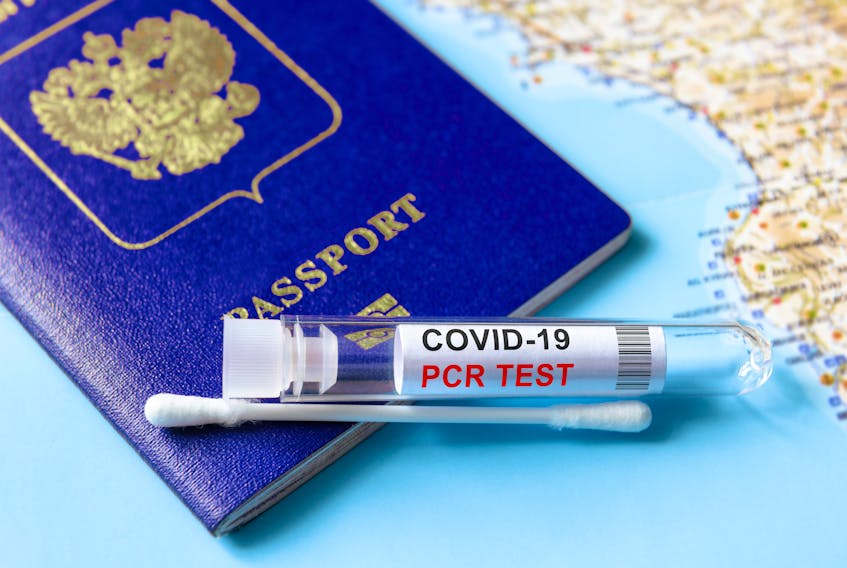ST. JOHN'S, N.L. — Point-of-entry testing — performing an immediate COVID-19 test on everyone who crosses the border into Newfoundland and Labrador — has become a major point of diversion between Progressive Conservative Leader Ches Crosbie and the other main contenders in the provincial election.
Crosbie has demanded for months the province adopt the practice, and has made it a central plank of his campaign platform. Both the Liberals and the NDP have said they would defer to the judgment of Chief Medical Officer of Health Dr. Janice Fitzgerald, who still believes it would be a pointless exercise.
When asked last week whether Crosbie would defer to the judgment of the province’s top public health official, the party issued a statement.
“The Liberals have chosen to hide behind talking points instead of evaluating science,” the statement said. “We will conduct a wide-ranging, comprehensive jurisdictional review of point-of-entry testing and work with public health to implement in a safe manner. All final decisions will be made by public health officials.”
The final sentence of that statement seems to contradict the central assertion that a Crosbie administration will implement border testing, unless a) he believes Fitzgerald will see the light, or b) he plans to replace her.
PC Party Leader Ches Crosbie says a PC Government will conduct an immediate, comprehensive review of COVID-19 point-of-entry testing in other jurisdictions.
Posted by PC Party of Newfoundland & Labrador on Tuesday, February 23, 2021
It’s a point the other parties have highlighted.
"(Fitzgerald) is making her decisions based on the science, and that is how health decisions should be made — not by politicians,” NDP Leader Alison Coffin said recently. "Point-of-entry testing, for example, is a snapshot of a person's health at any given time and not the level of their symptoms two days later."
The Liberals under Andrew Furey have taken an even more combative tone.
“Mr. Crosbie is rejecting the evidence-based decision-making of the (chief medical officer of health) and her team, who have guided Newfoundland and Labrador incredibly well throughout this pandemic,” the party said in response to Crosbie’s promise. “In order for Mr. Crosbie to implement point-of-entry testing in Newfoundland and Labrador, he would first have to reopen the Public Health Protection and Promotion Act, remove the decision-making authority from the (chief medical officer of health) and politicize decisions concerning the health and safety of Newfoundlanders and Labradorians.”
ON POINT OF ENTRY TESTING: When pressed by Paddy on Openline Ches Crosbie said, "let me be clear, POE testing would...
Posted by Liberal Party of Newfoundland and Labrador on Tuesday, February 23, 2021
Technical briefing
Lost in much of this is why the province does not see the merit in border testing in the first place.
Public Health officials offered a technical briefing for reporters in late November, but the logic offered then seems to have evaporated in the face of increasing demands by special-interest groups such as rotational workers.
The fact the federal government now demands pre-boarding test results from all incoming travellers, at the travellers’ own expense, has also served to deflate the chief medical officer of health’s position. And some provinces are also experimenting with the idea.
But one of the central points of Newfoundland’s position was efficient and effective use of resources.
At November’s briefing, officials pointed out that some provinces implemented a kind of random testing regime, rather than a targeted one. And they discovered the extra load hindered their ability to react swiftly to positive tests with contact tracing. Their turnaround times became so long that they had to get help from other provinces to reduce the backlog.
With thousands of people arriving in the province per week, they said, only a fraction of one per cent would be caught with testing, and the risk of false negatives would mean quarantine still has to happen anyway.

McMaster study
Crosbie speaks of a comprehensive review, but as officials with Public Health pointed out last fall, border testing in itself has long been known to be insufficient. As for looking at the science, the most expansive study of any significance is one being conducted by McMaster University researchers out of Pearson airport in Toronto.
The full report is not yet peer-reviewed, but preliminary results unveiled in early November have pretty well dominated all arguments for and against the practice.
In a nutshell, thousands of international passengers were asked to volunteer to take a COVID-19 test upon arrival and then take kits home to test again at Day 7 and Day 14.
Of those passengers that tested positive for COVID-19 at any point — which was between one and two per cent of them — about 70 per cent were caught at the airport. Another 25 per cent tested positive on Day 7, while only five per cent tested positive on Day 14.
Dr. Marek Smieja, one of the researchers, says none of the passengers they recruited were symptomatic on arrival — not surprisingly, since most airports screen passengers for symptoms before boarding.
Smieja said he and his colleagues hoped the study would inform decisions about quarantine, but added some length of quarantine is still the most effective preventive measure.
“Our main message really was asking what’s the value … of continuing quarantine until Day 14?” he said in an interview with The Telegram. “If you could test at Day 7, could you safely allow people to come out of quarantine.”
Around the same time the McMaster results were released, Newfoundland and Labrador did exactly that with low-risk rotational workers.
Smieja said another advantage of early testing is taking the guesswork out of symptoms, since many people can be contagious without even knowing it.
“In some ways, the testing regime captures a small number of people who are shedding virus who might not otherwise have been captured who might then have to isolate for 10 more days,” he said.
“Up to half of the people never become symptomatic and yet can still be shedding virus, and we actually think that’s a major reason this virus has been so hard to control around the world.”

Quarantine still needed
But he admits a negative test at the border can’t be a ticket to freedom.
“We have to be very, very careful that a negative test does not mean that you’re out of quarantine,” he said.
“That’s the danger with any sort of testing, is if people have had an exposure, get a test and they’re negative, well, they could become positive a few days later. So that’s where some sort of sensible duration of quarantine is still required.”
And that’s exactly what Fitzgerald’s argument has been.

“If you get a negative test when you’re coming into the province, it may give you a false sense of reassurance that, ‘Oh, I don’t have COVID,’ and we all know that not everybody will test positive when they’re first checked,” she said in November.
Fitzgerald reiterated her skepticism as recently as February, but admitted that the arrival of the more contagious B.1.1.7 variant may change things.
“This variant is a game-changer, so we have to, as I’ve said from the beginning, if evidence changes, if science changes, if the epidemiology changes — which it clearly has now — then we have to evolve with that,” she said.
“With these variants now, testing will not be replacing quarantine,” she added.
Peter Jackson is a Local Journalism Initiative reporter covering health for The Telegram. [email protected] | Twitter: @pjackson_nl









